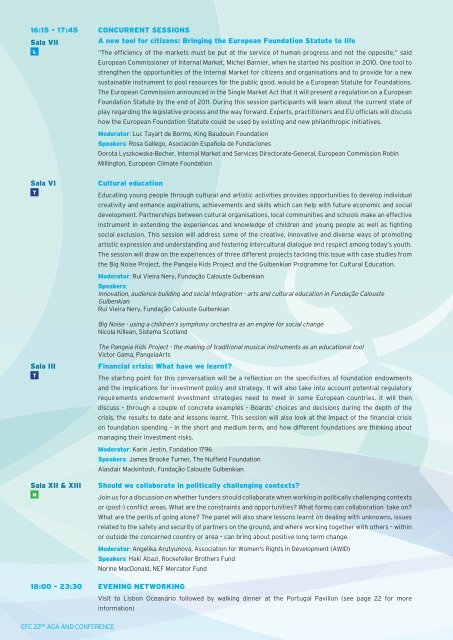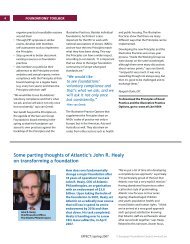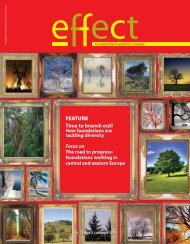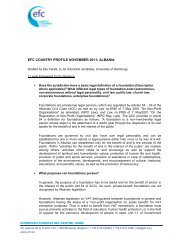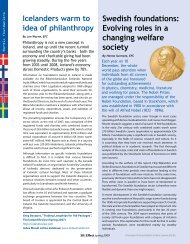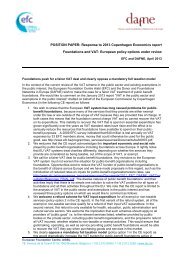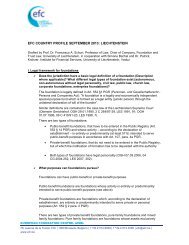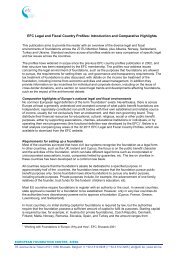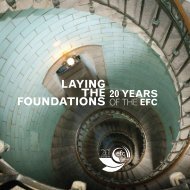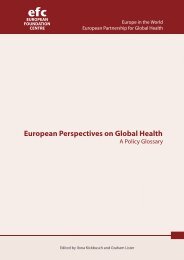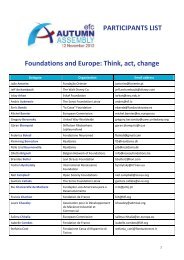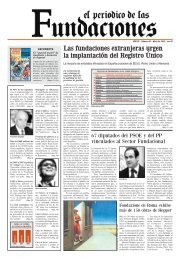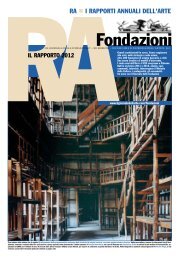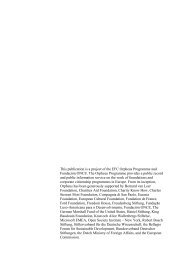Conference programme - The European Foundation Centre
Conference programme - The European Foundation Centre
Conference programme - The European Foundation Centre
Create successful ePaper yourself
Turn your PDF publications into a flip-book with our unique Google optimized e-Paper software.
16:15 - 17:45Sala VIILCONCURRENT SESSIONSA new tool for citizens: Bringing the <strong>European</strong> <strong>Foundation</strong> Statute to life“<strong>The</strong> efficiency of the markets must be put at the service of human progress and not the opposite,” said<strong>European</strong> Commissioner of Internal Market, Michel Barnier, when he started his position in 2010. One tool tostrengthen the opportunities of the Internal Market for citizens and organisations and to provide for a newsustainable instrument to pool resources for the public good, would be a <strong>European</strong> Statute for <strong>Foundation</strong>s.<strong>The</strong> <strong>European</strong> Commission announced in the Single Market Act that it will present a regulation on a <strong>European</strong><strong>Foundation</strong> Statute by the end of 2011. During this session participants will learn about the current state ofplay regarding the legislative process and the way forward. Experts, practitioners and EU officials will discusshow the <strong>European</strong> <strong>Foundation</strong> Statute could be used by existing and new philanthropic initiatives.Moderator: Luc Tayart de Borms, King Baudouin <strong>Foundation</strong>Speakers: Rosa Gallego, Asociación Española de FundacionesDorota Lyszkowska-Becher, Internal Market and Services Directorate-General, <strong>European</strong> Commission RobinMillington, <strong>European</strong> Climate <strong>Foundation</strong>Sala VITCultural educationEducating young people through cultural and artistic activities provides opportunities to develop individualcreativity and enhance aspirations, achievements and skills which can help with future economic and socialdevelopment. Partnerships between cultural organisations, local communities and schools make an effectiveinstrument in extending the experiences and knowledge of children and young people as well as fightingsocial exclusion. This session will address some of the creative, innovative and diverse ways of promotingartistic expression and understanding and fostering intercultural dialogue and respect among today’s youth.<strong>The</strong> session will draw on the experiences of three different projects tackling this issue with case studies fromthe Big Noise Project, the Pangeia Kids Project and the Gulbenkian Programme for Cultural Education.Moderator: Rui Vieira Nery, Fundação Calouste GulbenkianSpeakers:Innovation, audience building and social Integration - arts and cultural education in Fundação CalousteGulbenkianRui Vieira Nery, Fundação Calouste GulbenkianBig Noise - using a children’s symphony orchestra as an engine for social changeNicola Killean, Sistema Scotland<strong>The</strong> Pangeia Kids Project - the making of traditional musical instruments as an educational toolVictor Gama, PangeiaArtsSala IIITFinancial crisis: What have we learnt?<strong>The</strong> starting point for this conversation will be a reflection on the specificities of foundation endowmentsand the implications for investment policy and strategy. It will also take into account potential regulatoryrequirements endowment investment strategies need to meet in some <strong>European</strong> countries. It will thendiscuss – through a couple of concrete examples – Boards’ choices and decisions during the depth of thecrisis, the results to date and lessons learnt. This session will also look at the impact of the financial crisison foundation spending – in the short and medium term, and how different foundations are thinking aboutmanaging their investment risks.Moderator: Karin Jestin, Fondation 1796Speakers: James Brooke Turner, <strong>The</strong> Nuffield <strong>Foundation</strong>Alasdair Mackintosh, Fundação Calouste GulbenkianSala XII & XIIINShould we collaborate in politically challenging contexts?Join us for a discussion on whether funders should collaborate when working in politically challenging contextsor (post-) conflict areas. What are the constraints and opportunities? What forms can collaboration take on?What are the perils of going alone? <strong>The</strong> panel will also share lessons learnt on dealing with unknowns, issuesrelated to the safety and security of partners on the ground, and where working together with others – withinor outside the concerned country or area – can bring about positive long term change.Moderator: Angelika Arutyunova, Association for Women's Rights in Development (AWID)Speakers: Haki Abazi, Rockefeller Brothers FundNorine MacDonald, NEF Mercator Fund18:00 - 23:30 EVENING NETWORKINGVisit to Lisbon Oceanário followed by walking dinner at the Portugal Pavilion (see page 22 for moreinformation)EFC 22 ND AGA AND CONFERENCE


